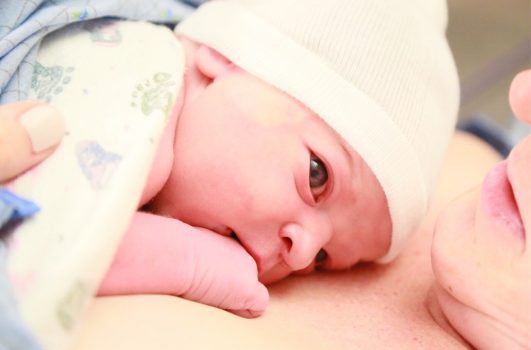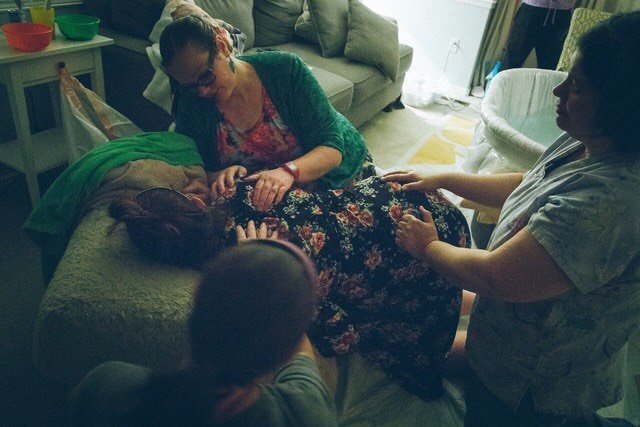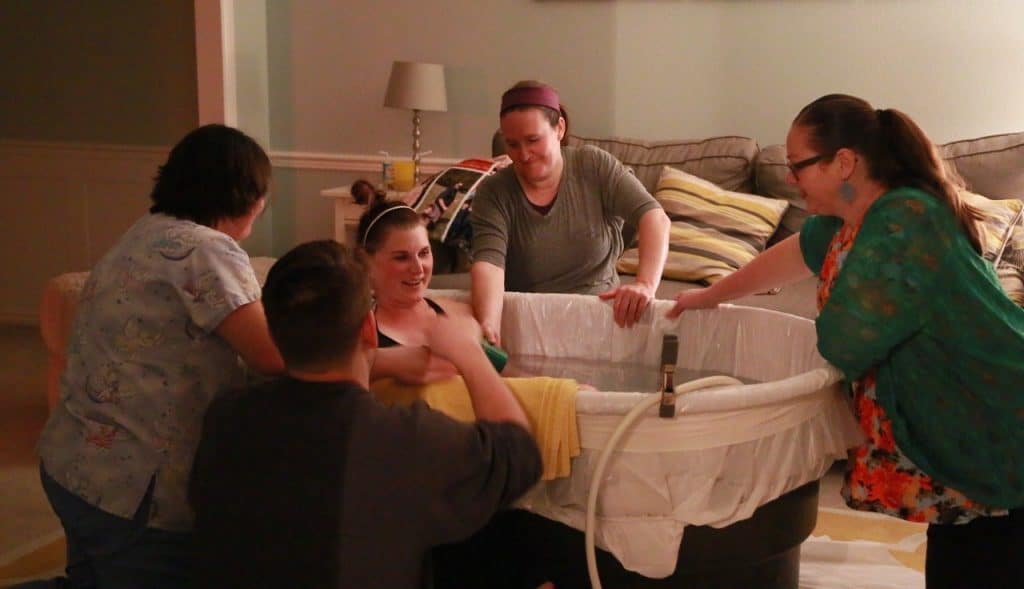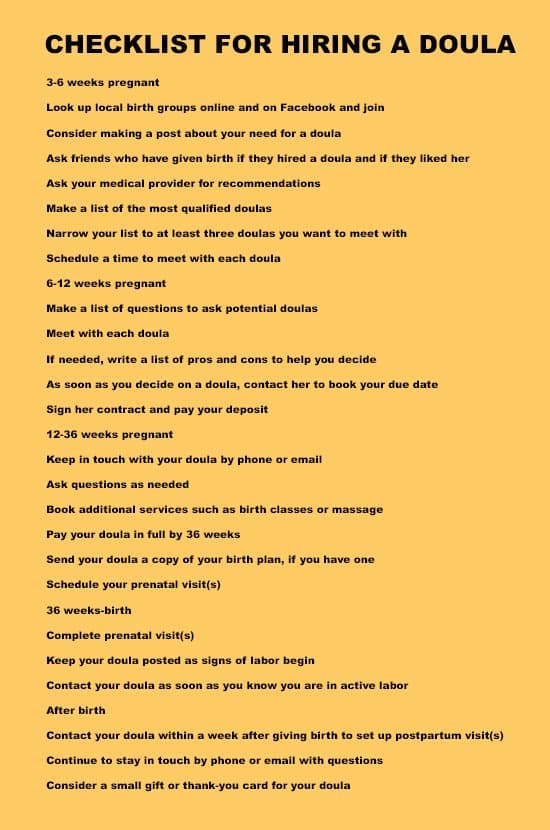If you’re expecting a baby, chances are you’ve heard the word “doula” at least once. But what exactly IS a doula? Many people tend to lump doulas together with midwives and assume that if you’re giving birth in a hospital with an OB, you don’t need a doula. That couldn’t be more false!
What is a Doula?
A doula is a professional labor companion. She (or he—but most doulas are women) will be able to help guide you through the last weeks of pregnancy and support you throughout your labor and birth. A doula doesn’t replace your spouse or birth companion—she is additional support. Her training, skills, and knowledge about the birth process make her a valuable resource to have available during your birth.
Do I Need A Doula?
Not every woman will feel that she needs a doula, but there is strong research that shows doulas are extremely beneficial for birthing women. According to evidencebasedbirth, women who have continuous labor support are:
- Less likely to have a Cesarean
- More likely to have a spontaneous vaginal birth
- Less likely to use pain medication
- Able to give birth in a shorter amount of time
- Less likely to give birth to a baby with a low Apgar score
- More likely to be satisfied with the birth experience
Any woman who will not have a dedicated parter/spouse/birth companion with them during labor should absolutely hire a doula. Those who have continuous support already should also consider hiring a professional doula if they want to see the benefits listed above.
Doulas are not only for women planning a birth without medication. They are extremely helpful in all types of births, from unmedicated home births to hospital births and cesareans. Though not all doulas are trained in every type of birth, there is a doula out there for just about everyone.
What Does A Doula Do?
Your doula can perform a wide variety of tasks. Her main focus will be to help you, the birthing mother, cope with labor. She may use a variety of techniques to do this, including the following:
- Suggesting positions for labor and birth
- Using comfort techniques like light massage, counter pressure, rebozo, and water
- Coaching your breathing through each contraction
- Aromatherapy
- Using verbal cues for hypnosis/guided imagery/meditation
- Providing you with positive feedback
- Making suggestions for ways to facilitate a smoother birth
In addition, she may also perform duties that don’t have to do with the birth, but are helpful, such as:
- Preparing or purchasing food for the birthing mother and her companion(s)
- Keeping the birthing space comfortable and tidy
- Running errands as needed
- Helping attend to siblings, if they are present
- Providing education to the birthing mother or couple
- Facilitating communication between the birthing mother and her medical staff
- Advocating for the birthing mother’s wishes during the birth process
- Transporting items to and from the birthing location
- Taking photos
- Anything else the birthing mother wishes
It’s important to know that doulas are NOT medical providers, and as such can not perform any medical tasks, such as checking the baby’s heartbeat, checking cervical dilation, or providing medical advice.
How to Find and Hire A Doula
Hiring a doula can be intimidating, but if you understand the process, it will go much more smoothly. First off, don’t wait until the end of your pregnancy to start looking for a doula! Many doulas book out months in advance. To ensure that you have plenty of options, start looking for a doula when you first find out you are pregnant.
If you’re already well into your pregnancy, don’t stress—you can still find a great doula! It just may take a little more work. Be prepared to spend some time contacting doulas until you find the right one.
To find your perfect doula, start by locating local birth groups online. Facebook is an excellent place to look, as well Google. Any birth-related groups will have lots of doulas in them. Most states have doula associations, so find the website for yours and browse doulas there.
If you know someone who has hired a doula and loved her, be sure to ask them for her information. The best way to find a great doula is by word of mouth. If someone you know loved her, chances are you will, too.
Look for doulas who specialize in the type of birth you are planning. Don’t hire a doula who only attends unmedicated births if you’re planning to get an epidural. If you are going for a VBAC, be sure to find a doula who has helped with lots of VBACS. There are even doulas that specialize in c-sections.
Interview Potential Doulas
Once you’ve made a list of at least three doulas you think would be a good fit, contact them to set up a consultation. Most doulas offer FREE consultations, but be sure to ask her if that is something she provides. When you meet a doula for a consultation, come with a list of a few questions you have about her or about the birth process and see how she responds.
As you interview doulas, you’ll find one that just “clicks.” Your personalities fit well together, and you feel comfortable around her. This is the one you want to hire. When you find that perfect doula, be sure to contact her right away to book your due date. Most doulas require a deposit to hold your date, so be sure to pay that right away. You don’t want someone else to snag your doula! Many doulas require you to read and sign a contract—be sure to read the contract carefully, as it covers things like refunds and missed births.
Stay in Touch with Your Chosen Doula
After you hire your doula, plan to stay in touch with her throughout your pregnancy by email and phone. She is there to provide you with information and support as needed, but you usually won’t spend a lot of time with her until later in your pregnancy.
Most doulas will want to meet with you at least once before the birth, usually around 36 or 37 weeks. At this “prenatal appointment,” she’ll ask you lots of questions about the kind of birth you are planning and what kind of support you would like. She’ll also be able to answer all of your questions about the process.
If your doula provides other services like childbirth education classes or massage, you can set up these appointments when you are ready. It’s a good idea to complete your birth class by around 36 weeks. It’s also a good idea to pay your doula in full by this date, and her contract will probably state when this should happen. Most doulas will not attend a birth if they haven’t been paid in full.
Your doula will be “on call” for you from about 38 weeks until the end of your pregnancy. Be sure to keep her updated as signs of labor begin! She’ll want to know as soon as baby is on the way so she can clear her schedule. Your doula will be with you from the time active labor starts until the baby is born, and usually several hours afterward.
Postpartum Doula Appointments
Most doulas also provide “postpartum appointments” where the come check on you several days after the birth and provide additional information and support.
This checklist will help guide you through the process of hiring a doula. Feel free to print if off and hang it on the fridge to keep you on track. If you follow this timeline as closely as you can, you’ll have your doula secured in plenty of time and won’t have to stress about it later on in your pregnancy.
Hiring a doula will be one of the best things you do to prepare for your birth. Every birthing mother can benefit from the additional support and information a doula provides. Don’t wait—start looking for your doula today!
*All photos courtesy of thetouchoflife.com







